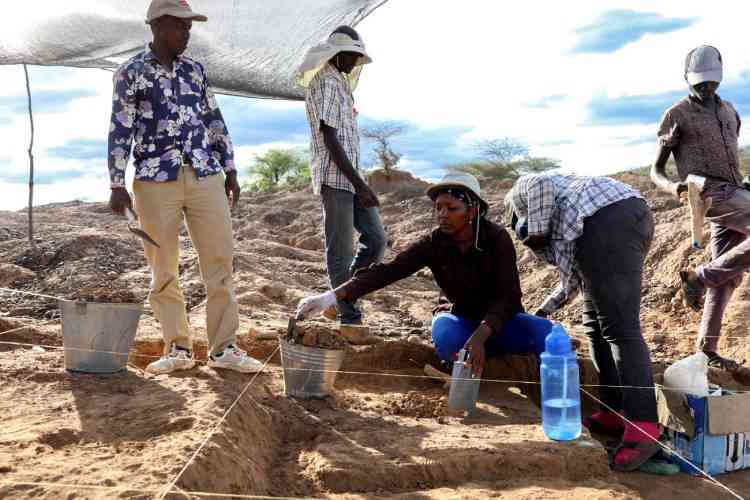
A joint team of Chinese and Kenyan paleo-archaeologists has discovered hundreds of stone tools dating back to the Paleolithic period near Lake Bogoria in Baringo.
The tools, which feature a refined method known as the Levallois technique, may offer new clues to the origin of modern humans.
"This period is a crucial stage for the origin of modern humans, and the tools that we have discovered may have been made by modern humans, or intelligent people, at a very early stage," said Zhao
Qingpo is a leading member of the team from China's Henan Provincial Institute of Cultural Heritage and Archaeology.
The Levallois technique, which involves shaping a stone core into a desired form before striking off flakes, was developed more than 200,000 years ago.
The team will conduct further research to determine the exact age of the tools.
Africa is widely regarded as the cradle of humanity, with human fossils dating back 6 million years having been discovered in Kenya.
However, the exact location and time of the emergence of early modern humans are still a matter of debate.
The joint team, which comprises more than 20 members from institutes including the Henan provincial institute, the Turkana Basin Institute in northern Kenya, and the National Museums of Kenya, has been cooperating on excavation in Baringo since 2017, although efforts were interrupted during the COVID-19 pandemic.
The team has also found fossils of animals that coexisted with the human ancestors who made the stone tools, such as ancient pigs, antelopes and elephants.
"We have found fossils of ancient pigs, antelopes and elephants in our field work," said Job Kibii, the director of research and science at the Turkana Basin Institute and the joint project director.
Kibii said the team hopes to specify a time frame for the tools found at the site, adding that the tools can reveal information about the identity, intelligence, challenges, and resources of the early humans.
He said that each type of stone tool had a specific use, whether for harvesting tubers or slaughtering animals, and therefore can illustrate the mode of subsistence at the time.
Soil samples will be collected and sent to China for dating, Kibii said, noting that there is preliminary evidence that people lived in what is now Baringo County 500,000 years ago.
Faith Wambua, a research fellow at the National Museums of Kenya, said that through working with the Chinese team, she has learned new technology such as photogrammetry, which can be used to prepare a 3D model for a stone tool.
Wambua, who has been working on the project since 2017, said the 3D models make it possible for Chinese archaeologists to conduct research without having to go to Kenya.
She said the discovery of such items as stone tools helps people understand their origins and appreciate the need to preserve their heritage for future generations.
Rebecca Muthoni, a staff member at the palynology and paleobotany section of the National Museums of Kenya, said she will collect soil samples and process them in the laboratory to study the pollen and plant remains in the soil.
She said this will help reconstruct the paleoenvironment and paleoclimate of the site, which can provide insights into the ecological context of the early humans.
 The Standard Group Plc is a multi-media organization with investments in media platforms spanning newspaper print
operations, television, radio broadcasting, digital and online services. The Standard Group is recognized as a
leading multi-media house in Kenya with a key influence in matters of national and international interest.
The Standard Group Plc is a multi-media organization with investments in media platforms spanning newspaper print
operations, television, radio broadcasting, digital and online services. The Standard Group is recognized as a
leading multi-media house in Kenya with a key influence in matters of national and international interest.











